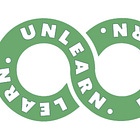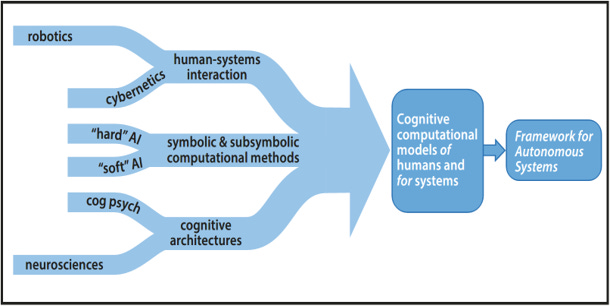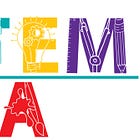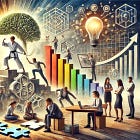Welcome to Polymathic Being, a place to explore counterintuitive insights across multiple domains. These essays take common topics and explore them from different perspectives and disciplines to uncover unique insights and solutions.
Today's topic investigates the Liberal Arts and why they are such a crucial educational foundation for addressing the complexity of the world around us. We’ll dive into the structure of these Arts and then explore how they feed science, civics, critical thinking, and even mental health.
We’re going to start today with the counterintuitive twist. Liberal Arts subjects are likely not at all what you think they are. Today, we associate them with degree programs like philosophy, journalism, or art on the more positive side, along with gender studies, settler colonialism, and critical race theory on the more esoteric. But how many people who graduate with a Liberal Arts degree can actually list the seven original, classic Liberal Arts? How many even studied one or more them in their degree program? To be fair, how many people can do this in general?
Personally, I didn’t know this until a few years ago. Much to my chagrin, I learned that the seven Liberal Arts have a long history as the core subjects of secular education in the Middle Ages and Renaissance. However, they were codified much earlier in the late Roman period and are typically divided into two groups:
Trivium: Grammar, rhetoric, and logic
Quadrivium: Arithmetic, geometry, astronomy, and music
You may recognize the Trivium of grammar, rhetoric, and logic from a previous essay on Critical Thinking, in which we capture a trifecta of skills of knowledge gathering, logical structuring, and critique. These three Liberal Arts help us organize information, think, and communicate our ideas, beliefs, and values.
Sadly, we should pause to consider that we had to write an essay on critical thinking addressing the many people who believe that you can’t teach critical thinking or, worse, that the very idea of critical thinking is somehow problematic. Why would people want to give up on this superpower? It certainly highlights the critical nature of the Trivium and how these Liberal Arts can help save the world.
Shifting to the other four Liberal Arts, known as the quadrivium, of arithmetic, geometry, astronomy, and music, it’s interesting how the ancients saw them:
Pythagoras argued that mathematics and the beauty of number, ratio and proportion were the first principles of everything in existence. His followers linked the four arts of astronomy, mathematics, geometry and music into one area of study called the Quadrivium. The study of number in particular was thought to purify the soul by putting it in mathematical harmony with the universe. Here the microcosm – the human soul – was at one with the macrocosm – the cosmos. Plato put the mathematical sciences at the heart of his design for the new Republic.
You might wonder why they would group arithmetic, geometry, astronomy, and music. One way to think about this is that arithmetic involves numbers in the abstract, geometry involves numbers in space, music involves numbers in time, and astronomy involves numbers in both space and time.
If the trivium is the foundation of thought and communication, then the quadrivium is the foundation for measuring and understanding the world. On top of these seven Liberal Arts, we build nearly everything from law to medicine to science.
The problem is that we’ve lost these seven arts over the last hundred years. A Liberal Arts education today will rarely teach even one of these skills, let alone the complete quadrivium for sense-making and trivium for critical thinking. Our educational systems have lost the very foundation of thought, and it shows. Let’s use the example of AI to see the impact.
The Liberal Arts Applied to AI
It’s interesting to note that the discipline of AI is (and should be) naturally polymathic, with multiple layers and dozens of disciplines needed to fully understand ethics, science, and human interaction with technology. Yet, we have tech-bros, monofocused on single attributes, churning out AI systems while ignoring the cascading consequences. Just imagine how much better we’d be if the human dimensions were much more appreciated than the mechanical ones.
On the other hand, we have artists who have what we currently call a Liberal Arts Degree but who graduated without the structured approach of making sense using maths and are ignorant of the critical thinking foundations of grammar, rhetoric, and logic. They react to AI without first understanding what it means to be human and then resort to absurd arguments, as we saw in AI Is[n’t] Killing Artists.
Between the two examples, we see the loss of a genuine human-centric consideration on both sides. Neither is properly grounded because, across many domains and disciplines, we’ve divided into two camps that have lost a common foundation and drifted into polarizing factions. I think that if we brought back the seven Liberal Arts, we could take a huge step in repairing our understanding, thinking, and discourse.
This is similar to a topic we explored a year ago in The Art of STEM, where an artificial separation between art and STEM has been created when, in reality, there’s a more healthy fusion. I’ve come to realize that the Liberal Arts likely offer a solution in AI and STEM as well as in most other disciplines.
The Liberal Arts Applied Everywhere
I don’t think it’s coincidental that, with the removal of these Liberal Arts, our civic discourse has become more polarized. We see rhetoric uncoupled from logic and logic uncoupled from intelligent sense-making. Instead, we must learn to communicate effectively, analyze policy logically, and engage respectfully. Just those simple steps will reduce misinformation and unproductive debate and improve dialog and collaboration to heal political divides.
Our mental health even requires them. The Quadrivium offers a perspective on balance, harmony, and proportion that can help us cultivate mindfulness. Exploring geometry’s sense of structure or music’s emphasis on rhythm and emotional resonance encourages self-awareness and emotional regulation and helps contextualize your relationship with the humans all around you.
Everywhere I turn, I see the power of these arts and the serious consequences as we’ve stopped formally teaching them in our schools. Today’s Liberal Arts programs are largely worthless mostly because they no longer teach the actual Liberal Arts. Imagine how much better our educational systems would be if we actually taught the Trivium and Quadrivium!
Summary
The Trivium of grammar, rhetoric, and logic and the Quadrivium of arithmetic, geometry, astronomy, and music are naturally polymathic ways of sensing and understanding the world and how we think and communicate our experiences. It’s time we re-establish them in our education systems and in our own lives.
Thankfully, nothing is stopping us individually. I’ve been intentionally applying these Liberal Arts to my own studies and working these ideas into my children’s education. In fact, Polymathic Being is the manifestation of these seven arts as we explore human-centric counterintuitive insights across domains and disciplines. It’s one small step to re-centering the Liberal Arts, and maybe, just maybe, we can save the world!
If you’re curious to learn more, check out this introduction to Polymathic Thinking:
Enjoyed this post? Hit the ❤️ button above or below because it helps more people discover Substacks like this one, and that’s a great thing. Also, please share here or in your network to help us grow.
Polymathic Being is a reader-supported publication. Becoming a paid member keeps these essays open for everyone. Hurry and grab 20% off an annual subscription. That’s $24 a year or $2 a month. It’s just 50¢ an essay and makes a big difference.
Further Reading from Authors I Appreciate
I highly recommend the following Substacks for their great content and complementary explorations of topics that Polymathic Being shares.
- All-around great daily essays
- Insightful Life Tips and Tricks
- Highly useful insights into using AI for writing
- Integrating AI into education
- Computer Science for Everyone








![AI Is[n't] Killing Artists](https://substackcdn.com/image/fetch/w_140,h_140,c_fill,f_auto,q_auto:good,fl_progressive:steep,g_auto/https%3A%2F%2Fsubstack-post-media.s3.amazonaws.com%2Fpublic%2Fimages%2F48e90ab2-1185-4e39-afe9-4316457c7f59_2560x1440.jpeg)


Thank you for pointing out the art within STEM. As someone who's been in the sciences for decades, it's nice to hear someone else recognize it.
I didn’t have a liberal arts education, and most of my knowledge beyond my major came from reading and self-education over the years. However, the most important factor shaping my critical thinking was my parents. They didn’t believe in mindlessly following authority or accepting information just because a book or an expert said so. They taught me to be an independent thinker. One of the best lessons I received from them was: “Listen to everyone, but do your thinking—and act based on what you believe is right, not just because someone told you to, including us.” That advice shaped my mindset and remains incredibly valuable to this day.
Now, let’s examine the state of education and its future from two perspectives:
1. Where We Are Today
Critical thinking has become more important than ever as we navigate a world saturated with information—some good, some bad, and much of it difficult to discern. A broader, interdisciplinary knowledge base helps us think better and evaluate what we encounter. Unfortunately, as the post highlights, schools increasingly fail to teach these foundational skills. If schools fall short, parents must fill the gaps and instill critical thinking in their children. However, this is easier said than done, as not all parents have the resources, time, or education to do so.
That’s why systemic reform is necessary. Schools need to focus not just on preparing students for tests or jobs but on teaching them “how to think”—an area where the classical liberal arts, such as the Trivium (grammar, rhetoric, and logic), could play a crucial role. These disciplines offer tools for effectively gathering, organizing, and communicating knowledge. Still, reform must go beyond looking backward. The challenges of today and tomorrow require a mix of classical principles and modern, forward-looking approaches.
2. Where We Are Heading
The world is changing faster than ever with the rapid advancement of technologies like AI, synthetic biology, quantum computing, robotics, and climate science. Many jobs will be transformed—or replaced—by these technologies, leaving many people searching for purpose, meaning, and identity in a world that looks nothing like today’s. In this context, education will need to evolve. I wrote a couple of comments (https://tinyurl.com/aytpa6sk) under a post about what to expect in the future. I know they may not be confirmed anytime soon, but we must prepare the next generations rather than let them live in chaos if it becomes true for many people in the next decade.
While technical skills are essential, we can’t focus solely on preparing students for specific careers that may soon become obsolete. Instead, education must prioritize adaptability, ethical reasoning, creativity, and interdisciplinary thinking. For example, the Quadrivium (arithmetic, geometry, astronomy, and music) could be reinterpreted to address modern challenges: arithmetic for data analysis, geometry for spatial reasoning in robotics, astronomy for exploring new frontiers, and music for understanding harmony and emotional intelligence in human-computer interactions.
Critically, we must also teach students what to think about, not just how to think. David Foster Wallace’s commencement speech, “This Is Water," highlights the importance of intentional focus and mindful thought. His message reminds us that education isn’t just about intellectual rigor—it’s about shaping how we perceive and engage with the world.
Our education system is inadequate for both current and future needs. Reform shouldn’t just revive the classical liberal arts and integrate them with cutting-edge disciplines to address the challenges of a rapidly changing world. For example, how can we combine the logic and rhetoric of the Trivium with AI ethics? How can we use the harmony and proportion of the Quadrivium to guide sustainable design in climate technology? These are the kinds of questions that modern education should address.
While the liberal arts offer a strong foundation for critical thinking and sense-making, we must also prepare for emerging technologies' ethical and social dilemmas. Reforming education requires looking to the past for timeless principles and to the future for new ways to apply them.
Parents and communities will need to step up if schools fail to adapt. However, the real solution lies in systemic reform that bridges the gap between classical education and modern innovation. We need an education system that prepares students for jobs and equips them to navigate uncertainty, think critically, and find meaning in a rapidly shifting world. Only then can we create a society capable of thriving in the face of unprecedented challenges?